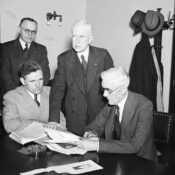The day before the Iowa caucuses, I boarded a bus at 5 a.m. to travel five-and-a-half hours to Dubuque, Iowa. A group of about 50 of us descended on the old river city to canvass potential voters. That is, we walked door to door and tried to convince whoever was inside to caucus for our candidate. I won’t say which candidate we were speaking for, but — as a hint — it wasn’t Deval Patrick or Michael Bennet.
I’ve canvassed before — for candidates and specific issues — but Iowa was a little different. To be sure, on the day before their highly publicized caucus in an election year that is looking more and more to be incredibly dramatic and hotly contested, most Iowans were sick of talking politics. Since the state is placed on a disproportionately high pedestal in the primaries, Iowans are routinely bombarded by throngs of presidential hopefuls every four years.
We arrived at the campaign office in Dubuque, and the local staff gave us a brief training in political canvassing. Of course, the goal is to persuade voters that your candidate is best for the job, but that isn’t always as straightforward as it sounds.
Like a significant portion of the country, I like to discuss politics online. Political discourse, between news comment threads, Facebook memes, and nonstop tweeting, ranges from enlightening (really!) to noxious to utterly untrue. The internet has transformed the way we talk about politics and government.
And, still, there is something to be said for a face-to-face conversation.
In spite of the potentially tremendous reach of a well-run online campaign, it doesn’t always have the same effect as the physical presence of a group of canvassers — especially if that group numbers in the thousands. Humans, in the flesh, talking to other humans can eliminate many perceptions of disingenuousness that percolate from the web. Of all the things I’ve been accused of while canvassing, being a robot has never been one of them.
After we received information on where we’d be canvassing, I set out with a group to the location. A local guy drove us to a suburban-looking neighborhood on the outskirts. He had grown up in Dubuque and was proud of his city, so it seemed as though he took the long route to show us its glowing golden-domed courthouse and the historic hillside cable-car elevator.
When he dropped us off, we marched up to the first house on our list. We had a name — let’s say Jason — and an age, 41. I knocked on the door, and we waited. This is the worst part of canvassing: awkwardly waiting on a stranger’s doorstep, feeling entirely out of place. When Jason opened the door, he confirmed our fears. He cut off our opening line, saying “You people have been here three times this weekend. If this keeps up, I’m going to vote for Trump.”
He closed the door on us, but it didn’t seem as though we were going to be successful in getting him to fill out a caucus confirmation card anyway, so we moved on to the next house. Door after door, we were met with disinterest, irritation, or no one at all. We began to think the endeavor was a bust. Even if we were passively distributing literature on Iowans’ front doors, it seemed as though we wouldn’t get the opportunity to turn out any voters.
Then we met David, a young dad who was just intoxicated enough to indulge us with friendliness and attention (it was the day of the Big Game, after all). He didn’t follow politics much, and he wasn’t aware of the caucus happening the next day, but he was interested in how policies could directly influence his family’s lives. We told David that we travelled hours that morning to talk to people like him because we believed in our candidate.
Even when people aren’t interested in following a political horse race, they can recognize genuine passion in a face-to-face conversation. A person who doesn’t devour the news might not have much of an impression of a presidential candidate’s tailored persona, but they can probably gauge the enthusiasm of a volunteer looking them in the eyes and describing their personal stakes in an election.
David was receptive, but we weren’t convinced that he would turn out to caucus the next day. It was a lot to ask: showing up in the evening to some church or college lecture hall and standing around for a few hours while people shuffle around the room to declare their support for one candidate or another. Many people we spoke to said they had work or other commitments that would prevent them from attending.
Toward the end of our route, at the second-to-last door we knocked, Amy answered the door. We were looking for a different voter at that address, but she said it was her sister-in-law, who hadn’t lived there in years. When we knocked, her dogs barked and woke her child from a nap. We apologized, but she was happy to see us and interested in talking about our candidate.
“I don’t know all of the issues up and down,” she said, “but I’m a definite supporter.”
Amy was a veteran, and she was hopeful about the kinds of changes our candidate could bring about. I asked her if she planned to caucus the next day. She was surprised that it was happening so soon, and she said she wouldn’t be able to make it because of her kids.
“You can take children to the caucus,” I said.
But she said it was during dinnertime and would be a hassle.
During canvassing training, volunteers are instructed to make the conversation as personal as possible. Before leaving, though, it is important to make a definite ask for support in the caucus. Even though it can be hard, it is important to let people know that they are being counted on. I looked at Amy and the bright blond boy hanging at her waist. She had been eager to talk about the issues and the political direction of the country at length, but making her voice count was just out of reach. I handed her a flyer with her caucus information on it and weakly asked her to reconsider.
We talked to others, some Republicans and some with plans to caucus for other Democrats. Occasionally they seemed reticent, like we might hurl arguments or insults once we found out they didn’t support our candidate. There wasn’t the time or appetite for that, though. We had doors to knock and they had snow to plow. We wished them well, and they did the same.
On the long bus ride home, I couldn’t help but think of Amy as my great failure of the day. Maybe she would caucus after all, but probably not. Should I have pushed her a little harder? Could it possibly have made a difference? Maybe the best scenario we could hope for was that she realized some other people felt strongly in the same ways she did, and, even though it can be nerve-wracking, it’s not so impossible to talk about it.
Featured image: Shutterstock
Become a Saturday Evening Post member and enjoy unlimited access. Subscribe now



